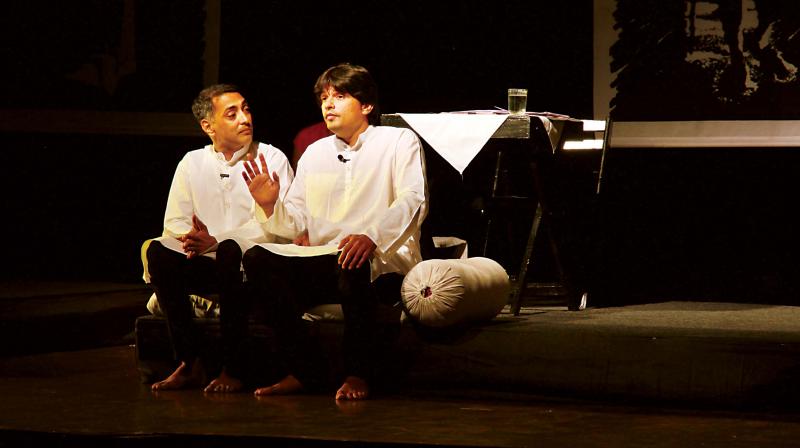The Mahatma and his Gurudev'
In 1914, Mahatma Gandhi, students of the Phoenix School in South Africa in tow, made his first visit to Santiniketan.

"This is so relevant even today!" Vijay Padaki, director, The Prophet and the Poet (which is edging quickly towards its 100th performance) has grown accustomed to audience members ambling upto him, wide-eyed, after the show, to discuss the many parallels they could draw, even today, from the letters exchanged by Mahatma Gandhi and Rabindranath Tagore. "It's something we get at the end of most shows," Padaki acknowledged. "They were so far-sighted in their exchanges.
In 1914, Mahatma Gandhi, students of the Phoenix School in South Africa in tow, made his first visit to Santiniketan. Rabindranath Tagore, who had founded the school some 15 years before, was 53-years-old and had just received the Nobel Prize. Gandhi, eight years younger, was only starting out his work in India, although his achievements in South Africa had already received acclaim. Both were strong personalities with very different views although common ground was achieved quickly, with Gandhi referring to Tagore affectionately as 'Gurudev', in a series of letters compiled by Viswa Bharati University. These were compiled and published as The Mahatma and the Poet.
This weekend, Atta Galata will host The Prophet and the Poet, a play inspired by these literary exchanges, directed and conceptualised by theatre stalwart Vijay Padaki. The production found huge success, density of content notwithstanding. "Our attention was drawn to the archival research of Prof Sabyasachi Bhattacharya, the former VC of Viswa Bharathi," explained Padaki. "We had a reputed long term programme of bio-historical plays called The History of Ideas. The task of scripting the adaptation was given to me."
Two great, strong-willed men who differed so greatly in their perspectives managing to find not just common ground but also mutual respect is the underlying focus of the play. "We don't have the exchanges wandering over many things," Padaki remarked. The content is, arguably, quite dense and adapting it to the stage required some tweaking. Interestingly, the actors don't portray Gandhi and Tagore on stage (Padaki emphpasises this). "We have actors as young people, friends, exploring the lives of Gandhi and Tagore - and rediscovering an important chapter in India's modern history." A third friend, the Narrator, links the past with the present and connects the characters to the audience.
Padaki, who describes his role in the process with great modesty, says, "Although this play is hugely successful, I have to admit that there is little or no content that is mine." The spoken word, he explains, stays absolutely faithful to the original letters. "My contribution as a writer has been mainly in giving the script a structure and a performance design. And as a director, I have got the three actors to strike the right balance between storytelling and empathy with the characters."
It is a tribute too, to India's men of letters, acknowledging a fast-dying medium and the thought processes it inspired. That stands out for the audience too, says Padaki, remarking, "The elegance of prose is noticed first. The vocabulary and syntax is rich, something we do not hear (or read) today.
The Prophet and the Poet has been staged at Sabarmati Ashram, Santiniketan and Thakurbadi-Jorasanko (Rabindra Bharati). A hugely successful tour of Trinidad & Tobago was followed by a second tour of Bangladesh, organised by the Ministry of Culture as part of the India-Bangladesh Joint Celebrations of Tagore's 150th birth anniversary, to celebrate his legacy in the other country that has adopted a Tagore composition as its national anthem!
What: The Prophet and the Poet (Hosted by Bangalore Little Theatre and The Takshashila Foundation)
When: July 28, 6 pm
Where: Alliance Francaise, Vasanth Nagar

